
Hajji Chrismansyah Rahadi, born Christian Rahadi, better known by his stage name Chrisye, was an Indonesian progressive pop singer and songwriter. In 2011, Rolling Stone Indonesia declared him the third-greatest Indonesian musician of all time.

Sabda Alam is a 1978 Indonesian album released by Musica Studios. It is Chrisye's second studio album and his first after signing with Musica. The album was written in collaboration with Guruh Sukarnoputra. It was well received and, in 2007, was listed by Rolling Stone Indonesia as one of the 150 best Indonesian albums of all time. Actually, this album was scheduled to be released in August 1977, but it was officially released in early 1978.

Hip Hip Hura is Chrisye's eleventh studio album, recorded in collaboration with Adjie Soetama. It was released in 1985 by Musica Studios. The album, with a similar beat to the earlier Aku Cinta Dia, was later certified silver. However, Chrisye was accused of plagiarism over the title song owing to similarities between it and Kenny Loggins' song "Footloose".
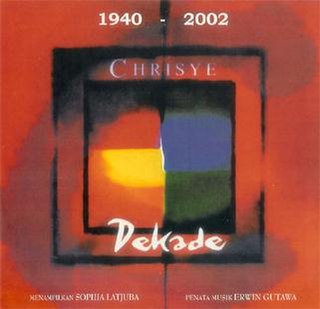
Dekade is a 2002 Indonesian pop album published by Musica Studios and Chrisye's nineteenth studio album. It is also his only cover album.
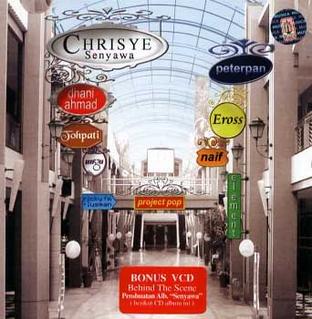
Senyawa is an Indonesian album released by Musica Studios in 2004. It was Chrisye's last studio album and features a collaboration with numerous Indonesian singers and bands, including Project Pop, Peterpan, Ahmad Dhani, and Ungu.

Konser Tur 2001 is an Indonesian album by Chrisye released in 2001 by Musica Studios. It is Chrisye's eighteenth studio album. Although the album is titled Konser Tur 2001, it was not recorded live; the title "Konser Tur" was chosen to coincide with Chrisye's tour in 2001. It included two new songs and reissues of some of Chrisye's more popular songs. The music video for one of the two new songs, "Setia" became controversial for its depiction of a woman dancing in tight clothing.
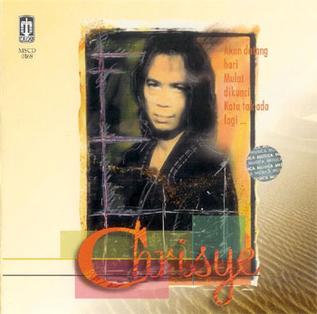
Kala Cinta Menggoda is a 1997 album by Indonesian singer Chrisye, with arrangement by Erwin Gutawa. It was released by Musica Studios and it also was his 17th album. It received numerous awards, including two Anugerah Musik Indonesia Awards, in 1998; the music video for the title song "Kala Cinta Menggoda" won the Asia Viewer's Choice Award that same year. This album was also recorded by Chrisye prior to his death, 10 years later.

Balada Shalawat is an Islamic religious album released in 2010 by Gita Gutawa. It was arranged, orchestrated and produced by Erwin Gutawa and published by Sony Music Indonesia. Written as a way to "bring people to pray and praise Allah", the album included two new songs and six covers or rearrangements. The proceeds from album sales were to be donated to the poor.

Percik Pesona is a 1979 album by Indonesian singer Chrisye and is his third album and the second with Musica Studios. The album was poorly-received, with Chrisye later reflecting that he had undergone second album syndrome.
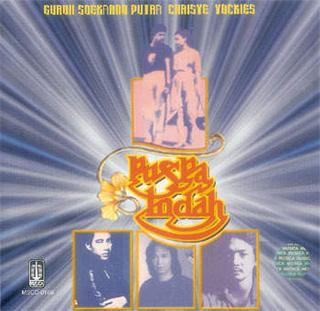
Puspa Indah is a 1980 album by Indonesian singer Chrisye, working in collaboration with Guruh Soekarnoputra. It was his fourth studio album and the third with Musica Studios.
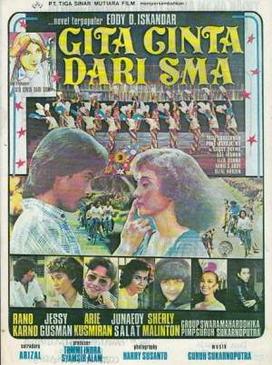
Gita Cinta dari SMA is a 1979 Indonesian film directed by Arizal and starring Rano Karno and Yessi Gusman.
Jockie Soerjoprajogo was an Indonesian musician and songwriter. Jockie began his musical career while a junior high school student in Balikpapan, East Kalimantan. After working with bands in Jakarta and Surabaya, in 1973, he joined with Ahmad Albar, Donny Fattah and Ludwig Leeman to form God Bless; he would remain with this band intermittently until the 2000s. Jockie also worked with artists such as Chrisye and Iwan Fals, ultimately writing two songs—"Kehidupan" ("Life") and "Kesaksian" ("Witness")—that were listed by Rolling Stone Indonesia as among the best Indonesian songs of all time.

Sendiri is a 1984 album by Indonesian singer Chrisye. It was his ninth studio album and eight with Musica Studios as well as his third album released in 1984 after Metropolitan and Nona (Miss).
Hajjah Hetty Koes Endang is an Indonesian kroncong singer. Her 1977 duet with Ajie Bandi, "Damai Tapi Gersang", was the first Indonesian song to win the World Popular Song Festival in Tokyo. The song was selected by Rolling Stone Indonesia in 2009 as one of the best Indonesian songs of all time.

Aku Cinta Dia is a 1985 pop album by the Indonesian singer Chrisye. It was his tenth studio album.
"Kidung Abadi" is a song written by father and daughter team Erwin and Gita Gutawa for the Kidung Abadi Chrisye concert; the concert was held on 5 April 2012 to commemorate the fifth anniversary of Chrisye's death. The song was created over a period of three months by splicing syllables from previously recorded vocals by Chrisye. At the concert, spliced black-and-white footage of Chrisye was shown lip synching to the song while Erwin's orchestra performed the music. The song was well received: the audience gave it a rowdy ovation, while critics praised its lyrics and described it as one of the best parts of the concert.

Pantulan Cita is a 1981 album by the Indonesian singer Chrisye. Recorded with much input from Jockie Soerjoprajogo, the album had rock influences and a cover design showing Chrisye's face as a puzzle. It was a critical and commercial failure, leading Chrisye to take a two-year sabbatical.

During his 40-year career, the Indonesian pop singer Chrisye (1949–2007) released 20 studio albums, 2 tribute or cover albums, 2 soundtrack albums, 10 compilation albums, an indie album, and 56 singles. He also recorded the soundtrack to three feature films, acted in two, and released 26 music videos. In 2008 Rolling Stone Indonesia listed five albums to which Chrisye contributed as among the best Indonesian albums of all time.
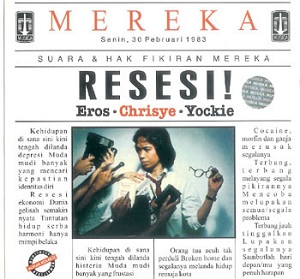
Resesi is a 1983 album by the Indonesian singer Chrisye. Recorded in collaboration with Jockie Soerjoprajogo and Eros Djarot after the latter's return from Germany, Resesi, which is Chrisye's sixth studio album, was inspired by the sound of The Police and featured songs influenced by CB radio and social criticism. It was a commercial hit upon release, selling 350,000 copies and being certified silver. In 2007 Rolling Stone Indonesia listed it as the 82nd best Indonesian album of all time.














